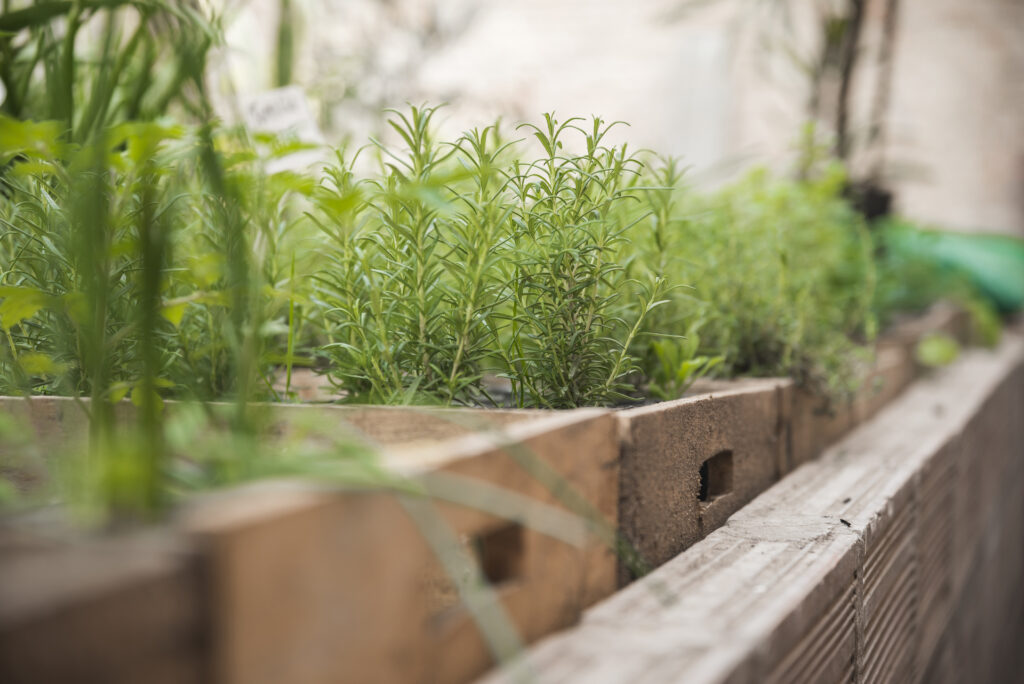
Did you know that herbs can provide homeopathic remedies for all kinds of common conditions? From lessening anxiety and improving sleep to lowering cholesterol and reducing inflammation, herbs have many uses outside of the kitchen. Since they’re not a significant source of calories, most herbs aren’t included in Guiding Stars’ algorithms, so you won’t find ratings on most varieties in the spice aisle. And of course, you should consult your doctor before adding herbal remedies to your wellness regimen. But after that important step, you may find some great options that decrease the need for traditional medicine and offer the same relief.
A Medicinal Herb Garden…at Home!
A natural approach to treating common conditions is just a shovel away. Medicinal herbs are easy to grow, affordable, and, in some cases, maybe even already growing in your garden.
Lemon Balm
Lemon balm is a member of the mint family that adds a beautiful scent and flower to your garden. It is a calming herb that can help lower anxiety, improve sleep, soothe stomach aches, and lower stress. Lemon balm may also heal small cuts and wounds, as well as improve acne.
How to use it: You can use fresh or dried lemon balm leaves. Add fresh leaves to beverages, salads, and more. Or steep a couple of tablespoons of fresh leaves in boiling water to make tea to enjoy warm or chilled.
Culinary tip: Replace lemon zest with finely diced lemon balm in this Red Lentil Salad with Dried Fruit and Toasted Pine Nuts.
Sage
Fresh sage earns 3 Guiding Stars and is easy to grow, and the soft green leaves will add nice texture to your garden. The plant remains delicious even after it flowers in mid-summer, and has many medicinal properties. Improving cholesterol levelsand possibly helping to lower fasting blood sugar are just a few.
Culinary tip: Herbs pair well with a variety of meats. Add sage to a homemade herb rub or your next turkey burger patty.
Chamomile
There are two popular types of chamomile plants, Roman and German. Both kinds are easy to grow and will add beautiful flower petals to your garden. They can also become your next home remedy for a variety of discomforts including inflammation, insomnia, and more.
How to use it: Tea and oil are the most common uses for fresh or dried chamomile petals. To make your own oil, use a clean jar, petals, and your choice of oil. You can mix the chamomile oil with creams or use it on its own.
Culinary tip: Tea is one of the most effective ways to benefit from chamomile’s healing properties. Steep two teaspoons of fresh or one teaspoon dried for 5-7 minutes. Chamomile also blends well with other herbs to create a more flavorful tea.
Calendula
Calendula plant petals and leaves are edible, though most people plant them simply to enjoy their “daisy”-like flowers. If you dry them, you can make scrubs, ointments, and more with the flowers. They can heal skin, treat inflammation, and help wounds heal faster.
How to use it: Mix dried calendula petals with sugar, coconut oil, or aloe vera gel to make topical scrubs and ointments.
Culinary tip: You can make tea with calendula petals. However, when taken orally, the plant can interact with medications and is unsafe for some.
Oregano
There’s a good possibility that oregano is already growing in your herb garden. And you likely use it to bring bold flavor to many recipes. But do you know that oregano can do way more than just season dishes? Rich in antioxidants, this herb can fight free radicals that may lead to chronic diseases, including colon cancer. It also contains compounds that have antimicrobial and antiviral properties.
How to use it: Add fresh or dried oregano to a variety of dishes. Or try making medicinal oregano oil at home (in this concentrated form it will have a very strong flavor).
Culinary tip: There are many uses for fresh oregano. Try using it in this Grilled Flank Steak with Roasted Vinaigrette.
Important reminder: Some herbs interact with medications and are unsafe for individuals living with certain conditions. Always consult with your doctor first!